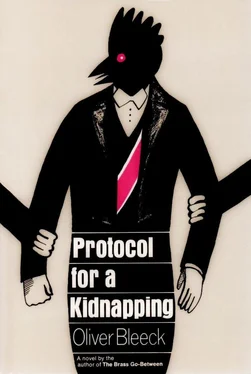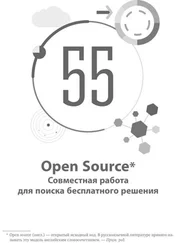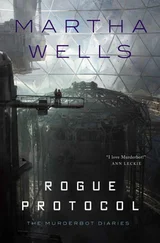He swallowed a couple of times and then nervously pointed to the two who’d followed me from the Metropol hotel and who now looked as if they were trying to blend with the wallpaper.
“Would these be the gentlemen?” he said I looked at the blond one, who looked away, and then at the short, stocky one who suddenly busied himself with a hangnail. “No,” I said, loudly enough for them both to hear, “I’m afraid I don’t know these gentlemen.”
I had been talking for almost half an hour. My throat was dry and scratchy so I decided to try some of the plum brandy that I had bought on my way back from the Hotel Astoria. Park Wisdom shuddered as I drank it. We were in my room and he was slumped in a chair by the window, a trifle pale, more than a little wan. Henry Knight was stretched out on the bed, staring at the ceiling. He looked better than Wisdom, but almost anyone could have.
“Where does it hurt?” I said to Wisdom who smiled feebly.
“Do you remember your pas de deux with the belly dancer?” Knight said to the ceiling.
“I thought your one-man revival of The Glass Menagerie was more interesting,” Wisdom said to the window.
“We made a lot of friends during the evening,” Knight said.
“Fostered understanding,” Wisdom said. “Gained valuable insight, too.”
“Oh, Christ, I’m dying,” Knight said.
“It’s my turn on the bed,” Wisdom said. “Die in a chair.”
“Sure you wouldn’t care for a drop?” I said, offering the bottle around.
Knight groaned, swung his feet to the floor and pushed himself up. Wisdom rose gingerly and walked slowly to the bed. Knight eased himself into the chair by the window and Wisdom carefully lowered himself onto the bed. “When do you want me to rent the car?” he said.
“Now,” I said. “This afternoon. Go for a drive, the fresh air will give you a reason for living.”
“And you think we might be followed?” Knight said.
“Don’t worry about it.”
“I can’t,” he said. “I can only suffer.”
“You’re seeing who this afternoon?” Wisdom said.
“Bill Jones.”
“Bill Jones,” he said. “What a nice, simple name. He’s probably looking forward to a quiet evening at hearthside surrounded by his family. He feels no pain. He suffers no remorse. I wish my name were Bill Jones.”
“Who do you think might follow us?” Knight said. “Friends of that guy who looks like you or friends of the other one from the Ministry of Interior, what’s his name—”
“Slobodan Bartak,” Wisdom said. “He doesn’t have a nice, simple name.”
“Either or both,” I said. “But it doesn’t matter. Just give them a nice, long ride.”
“There’ll be trouble in the Balkans come spring, gentlemen,” Wisdom said to the ceiling. “Mark my word.”
“Do you mean war, Sir Malcolm?” Knight said.
“Only needs a spark, Worlington-Hoopes.”
“To ignite the tinderbox of Europe,” Knight said.
“Damned fine phrase, Worlington-Hoopes. Yours?”
“Go rent the car,” I said.
At the door, Wisdom turned and said, “What time are you seeing Grandpa Pernik?”
“Arrie set the appointment up for five.”
“When you see Gordana,” he said, “tell her, well, you know, tell her that I love her.”
“You’ve recovered,” I said.
I used the garage exit of the Metropol to avoid being followed, caught a rare, government-owned taxi at the main post office, and handed the driver the address that Tavro had written down. It was another trip through blocks of buildings and apartments that seemed to fall into three distinct styles: early Hapsburg, with all of Vienna’s turgid froth, but none of its charm; late Stalinoid, grim and stark enough to create galloping paranoia; and what I suppose could be called Enlightened Revisionism, which had a lot of glass and aluminum and colored panels and whose twin could be found near any good-sized shopping center on the outskirts of Kansas City.
The driver stopped before a small old house on a block that the Nazi bombers seemed to have missed which was about three miles from the center of Belgrade. It was a short narrow street and the houses that nestled along the edge of the sidewalk had a turn-of-the-century air about them. They were built of dark brown brick and varied in height from two to four stories. The house that the driver kept pointing at was a three-story building with two dormer windows and a tiled, dark red roof. I could see no house number, but I paid the driver what was on the meter and his socialist conscience didn’t object to the tip.
The sun was out although it was still cold. Three cats, one tortoiseshell and two tabbies, sat on the third riser of the stone steps that led to the door and washed themselves and blinked at the sun and yawned at each other. They looked well fed.
I knocked on the door and when no one answered, I knocked again. The door opened about six inches and a woman’s face looked out at me. She had gray hair. “Mr. Jones,” I said. She nodded and then closed the door. I waited. The door opened wide this time and a man dressed in blue Levis and a gray work shirt looked at me with calm, dark brown eyes. He was taller than I, more than six feet, and he had broad heavy shoulders and a bull chest and almost no hips that I could see. His dark hair was sparse on top and he wore it full at the sides where its gray ends lapped and curled over the tops of his long ears.
“I’m looking for Bill Jones,” I said.
“I’m Jones,” he said in a deep grating voice whose harsh vibrato threatened to rattle the windows. “You’re the American.”
“St. Ives,” I said. “Philip St. Ives.”
He nodded and then, almost as an afterthought, held out his right hand. It was a big, hard hand, but he didn’t use it to show how tough he was. He wouldn’t need to. When I was inside he kept the door ajar and said something in soft Serbo-Croatian. The three cats scampered in and trotted down a hall toward the rear of the house.
“Belong to the kids,” Jones said gruffly. We went into a sitting room and he waved me to an overstuffed chair that was covered with a worn plum-colored fabric. It matched the sofa that Jones lowered himself into. There were some crude oils on the walls of mountain scenes, along with the stuffed heads of a large buck and a wild-eyed wolf. There was also a framed photograph of some smiling men in various uniforms in what looked to be a forest setting who toasted the camera with their canteen cups. They had rifles and submachine guns slung over their shoulders. A white tile stove gave off heat in one corner. The floor was covered with dark Oriental rugs.
Jones sat on the couch, leaning forward, his forearms resting on his knees. He had a careful, watchful face, heavy-chinned and full-lipped, with a blunt, strong nose and a deep, frowning V between his thick eyebrows. Harsh lines, almost furrows, formed trenches around his mouth. I judged him to be somewhere between fifty and fifty-five.
“You want to get in touch with Tavro,” he said, making it a statement. “When?”
“Tonight.”
He nodded. “Okay. I’ll get word to him. You want to meet at that same place?”
“The Impossible?”
He nodded.
“That’s fine,” I said.
“What time?”
“Late. Around ten.”
He nodded again as the gray-haired woman came in carrying a beaten brass tray with three cups and three glasses on it. The tortoiseshell cat followed her into the room and jumped up on Jones’s lap. He stroked its head with one large hand and it turned on its purring machine. “This is the wife,” Jones said as the woman offered me the coffee and slivovica. “She doesn’t speak much English.” He said something in Serbo-Croatian and the woman smiled at me. Despite the gray hair and drab dress, she was glowingly attractive and it was obvious that she once had been pretty, perhaps even beautiful. I said thank you and she smiled again and then served Jones.
Читать дальше












